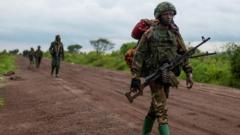Local authorities, such as North Kivu provincial assembly member Alexis Bahunga, have expressed alarm over the implications of Masisi’s capture, which he described as leading to a "serious humanitarian crisis." Calls have been made for the Congolese government to bolster military efforts in the region to counteract the insurgency. Eyewitnesses report that M23 leaders convened a meeting in Masisi, proclaiming their mission as one of national liberation.
The Congolese government has refrained from officially commenting on the situation in Masisi thus far. The town, with a population of almost 40,000, serves as the administrative capital of its namesake territory, located approximately 80 kilometers north of Goma, the provincial capital of North Kivu, which the M23 briefly occupied in 2012. In recent months, concerns have resurfaced about the possibility of the M23 advancing toward Goma, a city with a significant population, though fighting had subsided for a period before ramping up again in December.
In July, Rwanda acknowledged a UN report indicating the presence of about 4,000 Rwandan soldiers supporting the M23 in Congo, criticizing the Congolese leadership for its ineffective handling of long-standing regional conflicts. Rwanda has previously claimed that the DRC government is collaborating with individuals linked to the 1994 genocide in Rwanda, where ethnic Tutsis were targeted.
The M23 began its insurgency in 2012, originally under the pretense of safeguarding the Tutsi community in eastern DRC amid claims of enduring persecution. However, critics allege that Rwanda is leveraging this group to exploit the region's mineral wealth, including valuable resources such as gold, cobalt, and tantalum, key components in electronics and electric vehicles. The DRC recently initiated legal action against tech giant Apple for its supply chain practices concerning these "blood minerals," with Apple asserting that it has ceased sourcing from the country.
As the conflict escalates, observers continue to monitor the humanitarian fallout and the potential for renewed international intervention in the DRC's ongoing strife.
The Congolese government has refrained from officially commenting on the situation in Masisi thus far. The town, with a population of almost 40,000, serves as the administrative capital of its namesake territory, located approximately 80 kilometers north of Goma, the provincial capital of North Kivu, which the M23 briefly occupied in 2012. In recent months, concerns have resurfaced about the possibility of the M23 advancing toward Goma, a city with a significant population, though fighting had subsided for a period before ramping up again in December.
In July, Rwanda acknowledged a UN report indicating the presence of about 4,000 Rwandan soldiers supporting the M23 in Congo, criticizing the Congolese leadership for its ineffective handling of long-standing regional conflicts. Rwanda has previously claimed that the DRC government is collaborating with individuals linked to the 1994 genocide in Rwanda, where ethnic Tutsis were targeted.
The M23 began its insurgency in 2012, originally under the pretense of safeguarding the Tutsi community in eastern DRC amid claims of enduring persecution. However, critics allege that Rwanda is leveraging this group to exploit the region's mineral wealth, including valuable resources such as gold, cobalt, and tantalum, key components in electronics and electric vehicles. The DRC recently initiated legal action against tech giant Apple for its supply chain practices concerning these "blood minerals," with Apple asserting that it has ceased sourcing from the country.
As the conflict escalates, observers continue to monitor the humanitarian fallout and the potential for renewed international intervention in the DRC's ongoing strife.


















